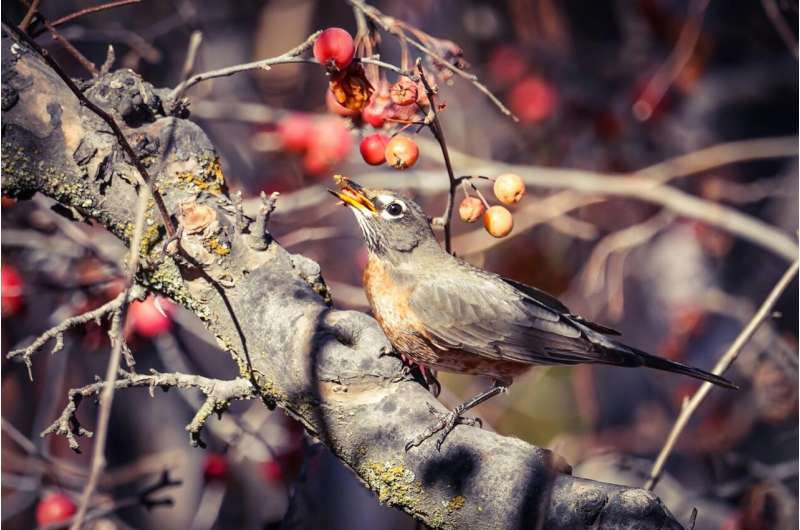Robins and other birds in Rhode Island are getting intoxicated by eating fermented winter berries, leading to stumbling and collisions. Freezing and thawing cycles ferment the sugars in the berries, causing unintentional inebriation in birds that rely on them for food during winter.
Coming off dry January, these birds are getting a little drunk

Key Takeaways:
- Birds like robins and waxwings are becoming intoxicated after eating fermented winter berries.
- Freezing and warming cycles increase sugar fermentation in berries, producing alcohol.
- Intoxication causes disoriented behavior, leading to collisions and potential dangers for birds.
- Natural toxins in berries like holly add additional risks that birds mitigate by consuming proteins.
- Symptoms of berry intoxication are transient and differ from the prolonged effects of avian flu.
An Unusual Sight in Rhode Island
In the past few weeks, Roger and Gail Greene have witnessed a curious scene through their Rhode Island home’s window. A flock of robins feasting on holly berries in their yard appeared to be stumbling around, and several even flew into their windows. Reflecting on their days running educational programs on common Rhode Island birds in the 1980s and ’90s, the former Department of Environmental Management employees surmised that these birds might be a little tipsy.
“They are flying under the influence (FUI),” Roger noted.
Fermented Berries Lead to Avian Intoxication
According to Scott McWilliams, a professor of wildlife ecology and physiology at the University of Rhode Island, the Greenes’ hunch is spot on. “Robins, waxwings, and other birds can become intoxicated this time of year after eating fermented winter berries,” McWilliams explained.
“They’re kinda like us in that they can be made drowsy and drunk by alcohol,” he told ecoRI News. The freezing and warming cycles characteristic of this season cause sugars in berries to concentrate and ferment while still on the trees. With insects and worms scarce during winter, these berries become a primary food source for many birds.
The Dangers of Flying While Intoxicated
While the sight of stumbling birds might elicit a chuckle, intoxication poses serious risks for avian creatures. “For us, we just fall down on the ground. For birds that fly, it can actually be catastrophic,” McWilliams said. Disoriented birds often lose their bearings, leading to collisions with objects like windows—which is exactly what the Greenes observed.
“What happens is they lose their bearing a little bit,” he added, noting that such incidents are common during this time of year.
Natural Berry Toxins Add to the Problem
Holly berries, in particular, carry their own set of risks. “Holly berries have a natural toxicity that lessens but is still present in the fruit after fermentation,” McWilliams noted. To safely process these toxins, birds need to consume proteins, typically sourced from tree flowers, which help mitigate the berries’ harmful effects.
McWilliams explained that plants develop such toxicity as a seed dispersal strategy. “If you make a perfect fruit, the bird is just going to come and eat the plant, poop or regurgitate the fruit and seed right there, and won’t move it around,” he said.
Distinguishing Intoxication from Avian Flu
The peculiar behavior of these inebriated birds might mimic symptoms of avian influenza. However, McWilliams clarified that the effects of intoxication are short-lived. “The tipsiness is a fairly transient thing… because the birds don’t like feeling that way either, I think,” he said with a chuckle.
In contrast, avian flu symptoms would persist much longer and exhibit a more consistent behavioral pattern. “It would be a more persistent behavioral pattern that would be worrisome,” McWilliams emphasized.
Embracing Unusual Winter Visitors
Despite the occasional thud against their windows and the mess of partially digested fruit on their car, the Greenes are delighted by their feathered visitors. The robins are likely migratory birds seeking the relatively warmer climate of Rhode Island during the winter months.
For now, the couple enjoys watching the antics of their neighborhood’s tipsy robins, appreciating the unique glimpse into this seasonal phenomenon.











